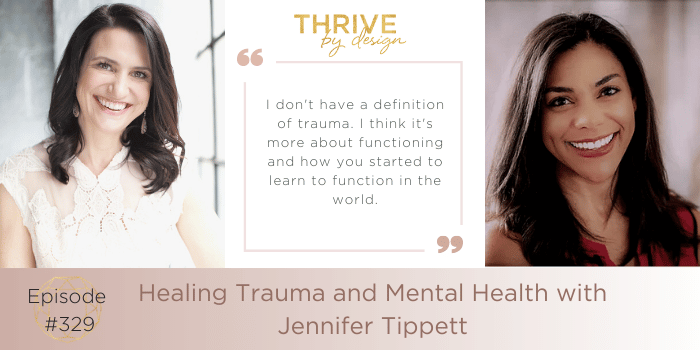#329 Healing Trauma and Mental Health with Jennifer Tippett

Content warning for: discussion of sensitive topics like trauma, mental illness, abuse, sexual assault, and suicide. If you or a loved one is struggling, I’ve included some resources in the show notes below.
Mental health – it’s something that we might not want to talk about, but we all know that it’s a critical part of success in life in business.
I wanted to broach this sensitive topic for makers and creatives who are dealing with trauma or struggling with their mental health.
You deserve to live a fulfilling, functioning life that allows you to embrace your creativity.
Nobody understands this better than Dr. Jennifer Tippett.
Jennifer serves as a professor at the University of Denver and the Director of Substance Use Disorder Specialty Unit in the doctoral program
She specializes in trauma and addiction, and the use of psychedelic medicine in therapeutic settings.
In her private practice, she works with this population in therapy and also coaches people before and after the use of psychedelics.
She sat down with me to talk genuinely about how trauma impacts our lives as creatives, business owners, and people.
Click here to download the show notes
Understanding Trauma
Early psychological definitions of trauma were very narrow and event-based. It was primarily understood as something only veterans and abuse victims experienced.
A lot of people meet with Jennifer and say something like, “I don’t have any trauma. Nothing bad has happened to me,” but they are often downplaying the impact their negative experiences have had on their life.
Our understanding of trauma is expanding. Jennifer talks at length about what she calls “ambient trauma,” resulting from experiences a person might not immediately recognize as traumatic, often in childhood.
A lot of people meet with Jennifer and say something like, “I don’t have any trauma. Nothing bad has happened to These experiences still affect our neurobiology and the way we learn to function in the world. They can impact the way we engage with other people, regulate our emotions, and organize our lives.
They leave us stuck in behavioral patterns from childhood that Jennifer might refer to as “trauma responses.”
One of the many ways trauma can manifest is by shutting down joy, play, and creativity.
Unlocking New Tools for Healing
One of Jennifer’s specialties is healing trauma through the use of psychedelic medicine in therapeutic settings.
Research is finding that trauma therapy in combination with psychedelic use can lead to promising results for those struggling.
Probably the most famous of these studies come from the organization MAPS, which has conducted extensive research on treating PTSD in veterans.
People who undergo treatment demonstrate not just symptom reduction, but symptom remittance – meaning their symptoms
Jennifer notes that it’s important to never use the word “cured” in psychology, because it oversimplifies the complex experiences of mental health.
But the results are promising.
They suggest that the effects of psychedelic treatment aren’t just dampening people’s emotional experiences, but helping them truly grapple with their trauma and process it in a life changing way.
Doing the Work
The current legality of psychedelic substances in the US gets in the way of Jen’s ability to work with clients in a clinical setting. But she’s able to offer set and setting consultations, followed up by valuable integration sessions.
This is critical to the process of healing. As Jennifer puts it, “psychedelics are not the treatment, they’re a tool for treatment… you gotta do the work.”
Finding ways to help people regulate themselves internally allows them to lead more functioning, fulfilling lives – and those strategies are hardly limited to psychedelics.
If you are struggling, or find that your state of mind is affecting your creativity, Jennifer advises to look internally: “there is an innate wisdom in us that knows what we need.”
Try to stay mindful of what you need, and how you’re meeting those needs for yourself.
Jennifer offered so much wisdom in such a short time, and I highly encourage you to listen to the full episode above for more tips on how you can integrate wellness practices into your own life.
xo, Tracy
National Suicide Prevention Hotline: 1-800-273-8255
Crisis Text Line: Text Hello to 741741
National Domestic Violence Hotline: Text “START” to 88788 or call 1-800-799-7233 SAMHSA
National Helpline: 1-800-662-4357
Links:
National Mental Health Hotline
MAPS – Multidisciplinary Association for Psychedelic Studies
More Resources for Jewelry Designersg

